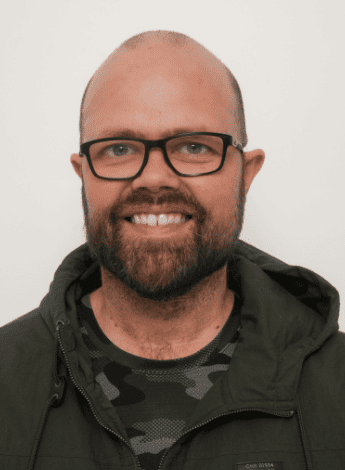
Championing gerontology

Recently awarded the titling credential, Adam Wilkes is transforming physiotherapy for older adults. Here, Adam discusses the benefits of movement and social interaction in the older population.
Adam Wilkes MACP is a physiotherapist with a deep passion for working with older adults.
Based in the Blue Mountains region of New South Wales, Adam—who was credentialed as an APA Titled Gerontological Physiotherapist this year—is focused on improving the health and wellbeing of the ageing population through a multifaceted role.
As the principal of In Step Physiotherapy, Adam has a case load that predominantly involves treating musculoskeletal issues.
At the Belong Blue Mountains Lower Mountains Neighbourhood Centre, he delivers exercise classes for those aged 65 and over, targeting areas such as strength, balance, mobility and falls prevention.
Additionally, through the Stronger Hearts program, he works to create movement-rich communities in aged care facilities and day centres.
‘It’s a bit multidisciplinary,’ Adam says. ‘There’s an exercise part plus consulting to try to help people realise the benefits of movement and social interaction.’
Adam graduated from the University of Sydney in 2005.
When he began his studies, he initially had little interest in the field of gerontology.
Academic Cheryl Hobbs sparked his curiosity about the critical role physiotherapists can play in aged care.
‘Cheryl was one of my tutors and coordinated our first clinical placements.
'At the time, she was researching a paper called “Physiotherapy students’ attitudes towards and knowledge of older people”, which we were asked (as students) to comment on.
'That paper stayed in my mind,’ Adam recalls. ‘I remember thinking, “Yeah, that is something I could really get into.”’
Over the years, Adam’s interest in working with older adults grew stronger.
He was drawn to the daily living challenges faced by retirees rather than the elite sports medicine he had first considered.
‘Funnily enough, I got less interested in sport and more interested in just day-to-day living for people post-retirement who weren’t elite,’ he explains.
‘Gerontology feels like the GP of physios in that we need to know broadly how ageing affects all the body’s systems, although it still allows us to explore a specific interest area.
'I want to help people overcome barriers to engaging in lifelong exercise, with a particular interest in chronic musculoskeletal conditions.’
He believes an older population can benefit from appropriately designed exercise programs that demonstrate how they can
integrate exercise into their daily lives and live to the full.
A transdisciplinary approach is a key part of his philosophy and is evident in his work with the Stronger Hearts program.
‘Helping seniors move is a problem too big for any one discipline to solve. Stronger Hearts is a physiotherapy and dance collaboration.
'My colleague has a dance background and we work with non-physios to deliver movement-based activities in aged care settings.
'They encourage people to move well and to do the things that are safe for them to do, while the physios do the consulting work on how they need to move.’
A priority is addressing the challenges of engaging older men in exercise and wellness programs.
‘We know a lot about that, research wise, but there are still fewer opportunities for older men to exercise in the way they feel they need to,’ he explains.
To tackle this, Adam facilitated a men’s wellness group that focused on social interaction and breaking stereotypes about ageing.
‘Belong Blue Mountains received a grant for its work in men’s wellbeing.
'Interestingly, the participants talked about herbal tea, wellness and caring for elderly fathers as they’re going into nursing homes.
'They were breaking the stereotypes of what it means to be an older man,’ Adam says, highlighting the importance of understanding the unique needs and perspectives of this demographic.
He says that while there is a wealth of excellent work happening in all fields of physiotherapy, gerontology is often overlooked and understaffed.
‘Being able to work with people over the long term is rewarding.

Adam Wilkes MACP.
'In gerontological physiotherapy practice you can see people develop independence, regain autonomy and overcome issues they never thought possible.
'But there are not as many clinicians in gerontology as there are people.’
This realisation, combined with his own experiences and encouragement from mentor and APA President Elect Rik Dawson, who is also an APA Titled Gerontological Physiotherapist, led Adam to pursue the titling credential via the experiential pathway (which has been superseded by the evidence portfolio pathway).
‘I think it’s beneficial to have specialty areas across the different physiotherapy fields that differentiate the profession and allow clients to identify and trust the services we offer.
'There are many physiotherapy practitioners who are operating at a high level of expertise but haven’t necessarily had it
recognised—titling and specialisation are ways to formalise this recognition for consumers, for other allied healthcare professionals and within the profession.
‘By enabling me to formalise and affirm my experiences to date, the titling pathway has enabled me to uncover some blind spots in my practice, which I can now develop further.’
The experiential pathway required successful completion of a written examination before being invited to undertake the clinical examination.
The process required a significant investment of time and effort but ultimately proved invaluable.
‘It was very rewarding but also nerve-racking because it feels like you’re putting all your chips in and then if you get rejected, you’re like, “Oh my gosh, should I even be a physio?”’ Adam says.
‘Allocating enough time regularly in a profession that is already busy is a challenge.
'However, the titling pathway has helped me to define and choose the areas I wish to specialise in to offer the best help I can to our local community.’
A bonus of undertaking the pathway was building connections with other physiotherapists nationally.
‘It enables you to network, coordinate care and learn from each other.
'My advice to others is to enjoy the process of learning and link it directly to your case load.
'Don’t feel that you need to know everything—there will always be more to learn. Embrace the opportunity to meet peers and learn from them.’
When away from work, Adam practises what he encourages. He hikes, wields the b in b jutsu (the martial art of stick fighting; b is the Japanese word for staff) and plays chess.
‘I like to keep the mind and body active. Through b jutsu I have learned a lot about movement patterns that help with balance and strength, which I have applied in gerontology.’
Adam has plans to undertake specialisation in the future.
‘I love lifelong learning. I love digging into the meat of things and there is so much to learn in physio.
'Undertaking the titling credential has helped me to identify what I need to study in the lead-up to applying for entry into the
specialisation training program—which courses I need to do, the reflective practices and the kind of people I need around me.
'Gerontological physiotherapy is a rewarding area of practice; to have the opportunity to provide distinctive, high-quality care to older adults is a real privilege.’
© Copyright 2025 by Australian Physiotherapy Association. All rights reserved.





